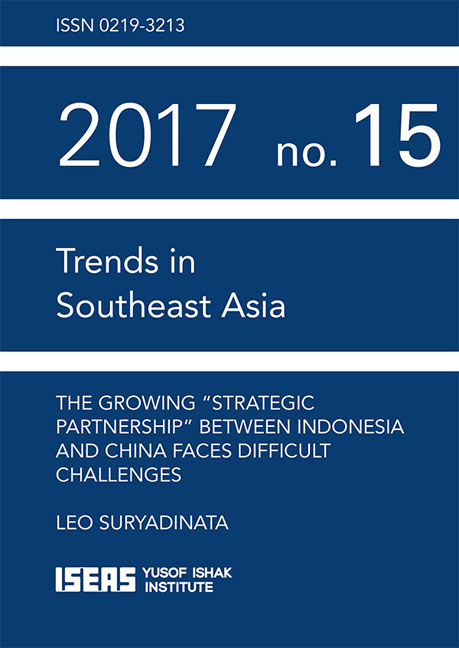The Growing “Strategic Partnership” between Indonesia and China Faces Difficult Challenges
Published online by Cambridge University Press: 12 March 2019
Summary
INTRODUCTION
Indonesia established diplomatic ties with Beijing in 1950 soon after the founding of the People's Republic of China (PRC). Relations began steadily but experienced a hiccup in 1959–60 due to Jakarta's ban on retail trade, which affected many ethnic Chinese in Indonesia. This resulted in a Chinese Indonesian exodus to China, but cordial relations were quickly restored when Sukarno returned to power. As the Indonesian Communist Party (PKI) grew to become a major actor, Sukarno moved further to the left: Sukarno's Indonesia and Mao Zedong's China eventually established the Jakarta–Hanoi–Beijing Axis during the 1962–65 period.
The struggle between the PKI and the Army led to the 1965 abortive coup and the dissolution of the PKI, followed by the fall of Sukarno and the triumph of the Army represented by General Suharto. Suharto considered the PRC, which supported the PKI, a major threat, and he froze diplomatic ties for twenty-three years until 1990. Tensions remained, however, and it was only after the fall of Suharto in 1998, and especially after the departure of President B.J. Habibie, that the relationship between Jakarta and Beijing became cordial again. Abdurrahman Wahid (Gur Dur) and Megawati Sukarnoputri started the improvement in relations. Both presidents were in office only for a short period, however, and more significant improvement took place only during the Yudhoyono presidency, which lasted for ten years, and in the subsequent Joko “Jokowi” Widodo period.
Indonesia today is a populous and resource-rich country but has a weak state with major economic and political problems. The Jokowi government has been eager to develop Indonesia's economy, while China now is an emerging superpower with surplus capital, goods and labour in need of overseas markets and development opportunities. It is obvious that there is mutual need between Indonesia and China. However, various issues in this cooperation remain, but in the short term, it appears that there will be more cooperation than competition.
THE YUDHOYONO PRESIDENCY (20 OCTOBER 2004 TO 19 OCTOBER 2014)
China in the twenty-first century has been eager to improve relations with Indonesia. Even before Yudhoyono was officially sworn in as president, the PRC had sent a high-level trade delegation to meet him at his residence in Bogor to discuss future cooperation.
- Type
- Chapter
- Information
- The Growing "Strategic Partnership" between Indonesia and China Faces Difficult Challenges , pp. 1 - 25Publisher: ISEAS–Yusof Ishak InstitutePrint publication year: 2017



